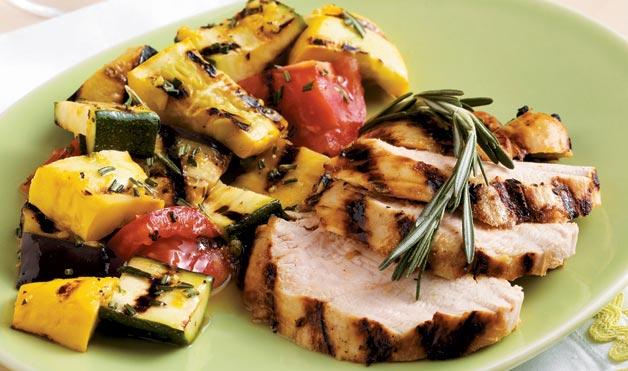 The signs of spring are among us; the birds are chirping, trees are budding, and temperatures are rising. With warmer temperatures, outdoor activities become more common and this includes outdoor cooking. Grilling is a popular method of preparing meals, especially in warmer months. Grilled food tastes like no other; however, grilling can have a dark side if not done correctly. There are a couple of reasons why grilling is linked to increased risk of developing cancer.
The signs of spring are among us; the birds are chirping, trees are budding, and temperatures are rising. With warmer temperatures, outdoor activities become more common and this includes outdoor cooking. Grilling is a popular method of preparing meals, especially in warmer months. Grilled food tastes like no other; however, grilling can have a dark side if not done correctly. There are a couple of reasons why grilling is linked to increased risk of developing cancer.
The Menu
Many barbecues consist of burgers, hot dogs, pork chops, etc. Research has found that consuming more than 18 ounces/week of red meat, pork or lamb has been linked to certain types of cancer [1]. In addition, processed meats such as brats, hot dogs and lunch meat are cured, smoked or contain nitrates and nitrites. These types of foods are linked to risk of cancer and quite strongly associated with colorectal cancer specifically [5,6].
The Grilling Process
During the process of grilling, two different chemicals play a role in the risk of cancer: Heterocyclic amines (HCAs) and polycyclic aromatic hydrocarbons (PAHs) [4]. HCAs are produced when the protein found in red and white meat (i.e. chicken, fish, beef, pork, etc.) are exposed to high heat. Studies with rodents have found that exposure to HCAs has been linked to colon, stomach, prostate and breast cancers specifically [4]. In addition, they have found that the amino acids, sugars and creatine found in the muscle within the cut of meat react when they are exposed to very high heat.
PAHs are carcinogens that are produced when your food is exposed to smoke. Usually when grilling, the juices and fat drippings from the meat come in contact with the coals or flames and create a white smoke that sticks to the meat, PAHs. This process can also take place when using a smoker [4].
There is concern related to the ingestion of these carcinogens, because they have a tendency to mutate and cause changes in DNA according to laboratory studies [4]. Does that mean we have to cut out grilling forever? Definitely not, there are ways that we can still enjoy grilling without increasing exposure to carcinogens.
Grilling Time:
The longer the meat is exposed to high heat temperatures, the higher level of carcinogens it may have [3,4]. Multiple studies have found higher risk to cancer associated with consumption of meats that have been exposed to high heat and cooked well done to very well done. Food safety is certainly important, especially when receiving chemotherapy, and cooking meats to safe temperatures is key in preventing exposure to bacteria. However, overcooked meat will have a higher level of HCAs [3,4].
Choosing a smaller cut of meat when you plan on grilling can dramatically reduce the time exposed to high heat and smoke. Kebabs would be a perfect example as you can use smaller pieces that don’t require as much cook time. In addition, flipping meat frequently during cooking can reduce the HCA formation [4].
Smoke Exposure:
When meat is exposed to the flames, it leaves your food unprotected against the smoke increasing PAH carcinogens [4]. Utilizing a barrier when cooking can be a great way to maintain the experience of grilling outside, while protecting your food. Using a high grade stainless steel grill pan or even cast iron pan are great ways to cook your food on the grill and prevent exposure to PAHs.
Fat Content:
Fat content is important to consider when grilling; the fattier choice of meat, the more drippings it will have and the more smoke it creates. Since it is recommended to consume less red meat, pork and processed meats, choosing leaner meats such as chicken, turkey or fish will be an added bonus. Grilling vegetables is also an option. Not only will you eliminate the HCAs, but many non-starchy vegetables don’t require long cook times which would reduce exposure to PAH carcinogens [4].
Marinades:
Studies have found that marinating meats before grilling actually reduces the HCA level [6,7]. More specifically, utilizing high antioxidant herbs/spices in the marinade such as fresh garlic, rosemary, ginger, red chili peppers, and thyme have shown to be beneficial [7]. In fact, one study marinated beef in beer and herbs for 4 hours prior to grilling and found a 90% reduction in HCAs when compared to beef that was not marinated [7].
Processed Meats:
It’s not uncommon during a barbecue for brats and hot dogs to be grilled and served. These products tend to be higher in fat, and as explained above, are likely to create PAH carcinogens when cooking. However, avoiding these meats goes beyond grilling. Processed meats themselves contain carcinogens that are harmful [3,4]. Nitrates and nitrates are found in many processed meats to help preserve them and have been linked to increased risk of many types of cancer including pancreatic, gastric and colorectal [5]. Some inquire about the option of nitrate/nitrite free processed meats, however the verdict is still out and more research is needed related to cancer risk.
Other Meal Essentials:
Make sure that when you are grilling you incorporate plenty of cancer protective foods such as fruits/vegetables. Cruciferous vegetables such as broccoli, cabbage and Brussels sprouts are an especially good pairing as they contain nutrients that help with DNA repair and contain compounds that can bind to carcinogens, reducing the amount your tissues can absorb [2].
There aren’t any specific guidelines that specify the frequency of grilling that would be safe, but if you incorporate good grilling practices, consume less than 18 ounces of red meat, pork and lamb, and include lots of colorful vegetables on your menu, you can continue to enjoy grilling dinner while enjoying the warm weather.
Resources:
- American Institute of Cancer Research (AICR). http://www.aicr.org/reduce-your-cancer-risk/recommendations-for-cancer-prevention. Accessed March 24, 2015.
- Higdon, J. Cruciferous Vegetables and Cancer Risk. http://lpi.oregonstate.edu/ss06/vegetables.html. Accessed on March 24, 2015.
- Punnen S, Hardin J, Cheng I, Klein EA, Witte JS (2011) Impact of Meat Consumption, Preparation, and Mutagens on Aggressive Prostate Cancer. PLoS ONE 6(11): e27711. doi:10.1371/journal.pone.0027711
- National Cancer Institute. Chemicals in Meat Cooked at High Temperatures and Cancer Risk. http://www.cancer.gov/cancertopics/causes-prevention/risk/diet/cooked-meats-fact-sheet. Accessed on March 23, 2015.
- The Physicians Committee for Responsible Medicine. Drop the Dog. http://www.pcrm.org/health/health-topics/dropthedog. Accessed on March 24, 2015.
- Rashmi Sinha, Wong Ho Chow, Martin Kulldorff, et al. Well-done, Grilled Red Meat Increases the Risk of Colorectal Adenomas. Cancer Res 1999;59:4320-4324.
- Viegas, O., Amaro L.F., Ferreira I., and Pinho O. Inhibitory Effect of Antioxidant-Rich Marinades on the Formation of Heterocyclic Aromatic Amines in Pan-Fried Beef. J. Agric. Food Chem., 2012, 60 (24), pp 6235–6240.



